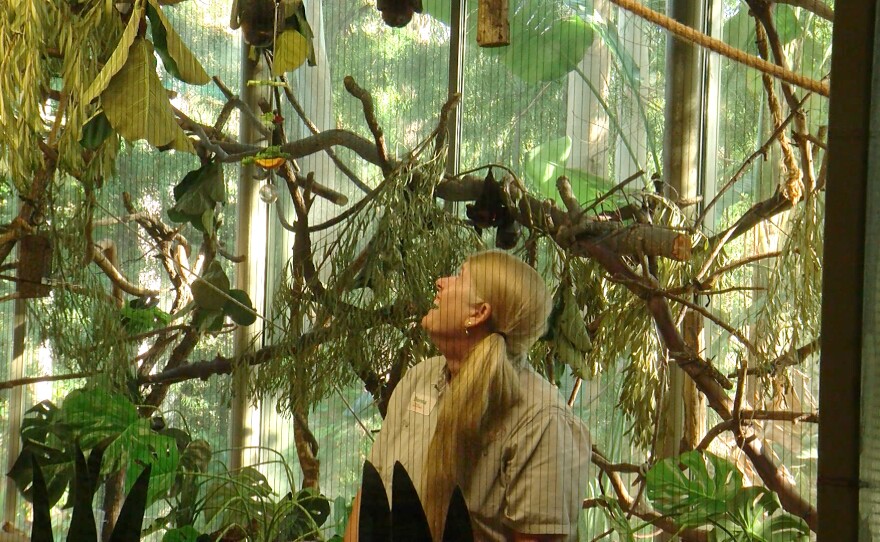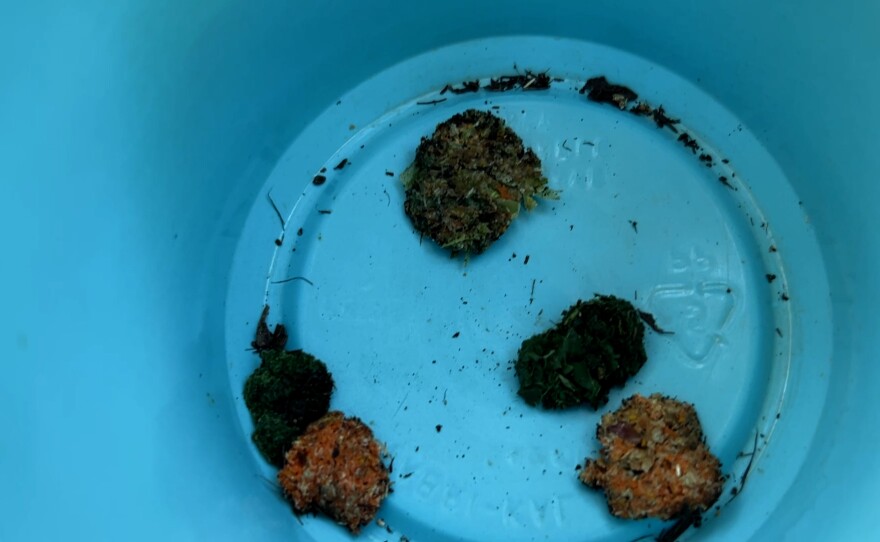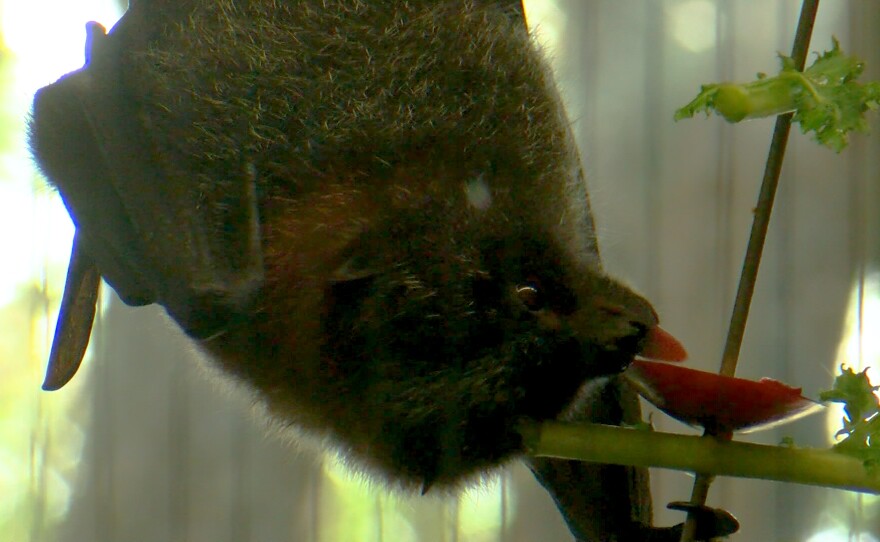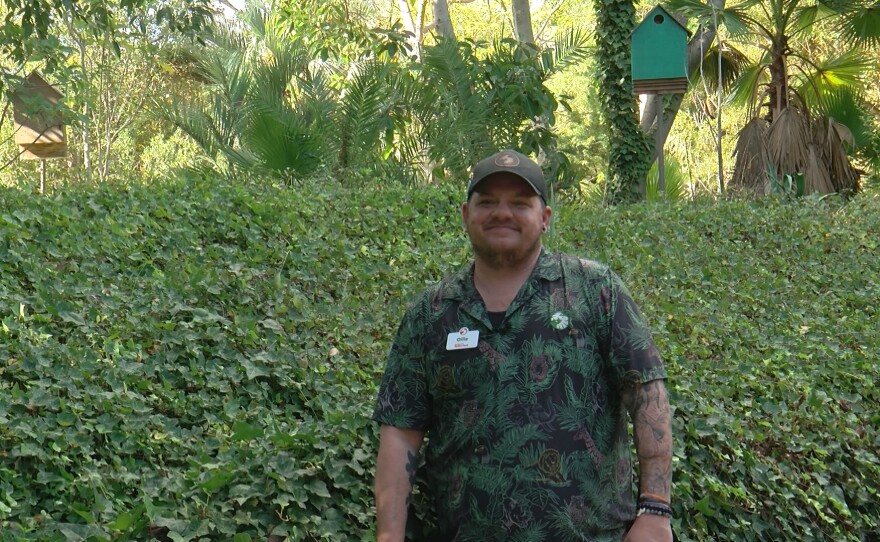It is Bat Week, an international celebration of the flying mammals and their importance. I visited the San Diego Zoo Safari Park to get some bat facts.
Bats get a bad rap. Maybe it's Bram Stoker's fault for infamously linking them to vampires in his novel "Dracula." But Marco Wendt, wildlife ambassador for the San Diego Zoo Wildlife Alliance, pointed out that out of about 1,400 bat species, only three feed on blood.
"Most bats are insectivores. They eat insects like mosquitoes," Wendt said. "But many are pollinators, eating fruit and nectar from a lot of the plant species found around the world."
These bats are vital for pollinating flowers and spreading seeds. Donna Kent, senior wildlife care specialist at the Safari Park, works closely with bats and would like to dispel a common myth.

"A bat is not going to fly in your hair unless it's a 6-foot-tall bouffant loaded with hairspray and there are moths in your hair," Kent said. "So many misconceptions. And what we fear, we usually don't like, and what we don't know, we don't like. So the more you know, the better."
And Kent knows a lot about the Rodrigues Island fruit bats she spends her days with.
"They're only found on Rodrigues Island, which is in the Mauritius Island complex in the middle of the Indian Ocean," Kent explained.
Rodrigues Island fruit bats, also referred to as flying foxes because of their facial features, are from a tropical habitat, so the exhibit is kept warm and humid to keep them happy. One reason the Safari Park has these bats is that they are an endangered species.
"Back in 1979, they were virtually wiped off the island," Kent explained. "Only 70 of those bats remained after a tropical cyclone went through and a lot of their area was deforested. If you're a flying fox, you roost in trees. So the big barrier trees were gone. But conservationists thought ahead and brought some of those bats into a breeding situation, which we are part of. Again, today, the numbers are at least 20,000, but in the grand scheme of things, that's nothing."
Local bat species face threats here in San Diego.
"Locally, it would be the use of pesticides and then the light that we humans give off at night," Kent said. "The darker the night sky, the better it is for our local microbats that are out hunting insects."
Kent has a daily routine with the bats and has come to know their personalities.

"We do a head count to make sure everyone is all right and healthy and hanging upside down like they should be," Kent explained. "We then clean up. When a fruit bat eats fruit, it's different than us humans. We chew and swallow. A fruit bat chews, they extract all of the juice and fluid, and then they spit out the fiber. So we clean up little bat pancake patties of fiber all over the ground. Then it's time to prep their diet. They get a fancy fruit salad."

When Kent puts out the fruit skewers, the sleepy bats can show their agility.
"What you're going to see is the climbing with their thumbs. And bats are in the order Chiroptera, 'chirop' referring to hand and 'ptera,' wings. So they are the hand-winged mammals and quite dextrous. My favorite fact about a bat is bats are the only flying mammal. Everyone says, 'No, there's flying squirrels. There are gliders and such.' They glide — they do not flap. Bats are the only flapping, truly flying mammals."
In addition to the Rodrigues bats, the Safari Park also provides a refuge for native bat species.

"Here at the San Diego Zoo Safari Park, we do a lot of incredible work with bats, and we do work with rescue and rehabilitation with Project Wildlife as well," said Ollie Zirbel, wildlife care supervisor. "We've got over 20 bat boxes on the property, and the bats are going to live in them during the day. They're going to zoom out at night, go hunt some bugs and then fly back in for the protection the next morning. These bat boxes will hold between 100 and 200 native bats that are about the size of a chicken nugget. Bat boxes like these behind me are going to be used for generations. They have what's called high roost fidelity, so bats are going to come back year after year. It's great to see more and more bats, which is part of why we keep adding bat boxes in this space for them."
The best time to see the bats fly out is right after sunset. Native bats also enjoy the park’s Baja Gardens.
"What makes our Baja Gardens and World Gardens so unique, we have a lot of native bat species that often use this as a food source and help pollinate a lot of the plants," Wendt said. "Like the Mexican long-tongued bat, which is an infamous bat known for pollinating a very special plant, the agave, which is where we get our wonderful tequila and mezcal. So big kudos for the Mexican long-tongued bat."
Visitors can stop by the Safari Park this week — or anytime — to learn more about these amazing but often misunderstood flying mammals.
Check out my daily fun bat facts on Instagram every day this week:





